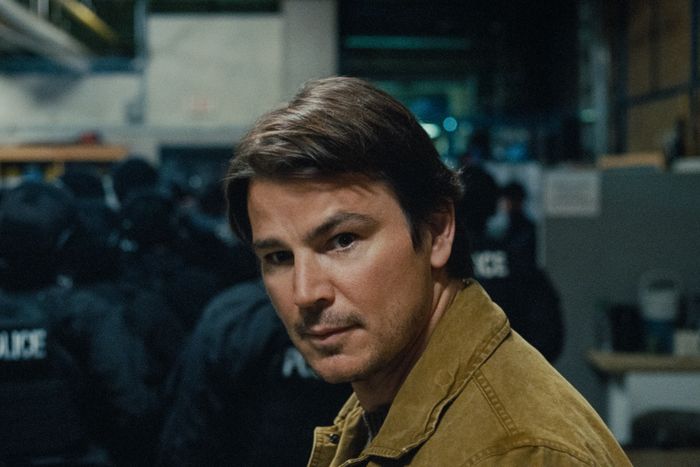
Early on in M. Night Shyamalan’s Trap, Josh Hartnett’s character makes a trip to the bathroom as an excuse to hide in a stall and pull up the webcam he has pointed at his latest victim, a young man who’s chained up in what looks like a basement. Hartnett plays Cooper Adams, a Philadelphia firefighter who, unbeknownst to his wife and kids, is also a prolific murderer nicknamed “the Butcher” because he carves his targets into pieces before dumping the parts. The camera lingers on Cooper for a few beats before showing us what’s on his screen, and the expression on Hartnett’s face is genuinely spectacular. There’s speculation there, as well as a restrained anticipation, but more than anything, he looks like a display glitching out and revealing the operation system it’s been running on — muscles misfiring, eyes dead. Cooper has brought his daughter, Riley (Ariel Donoghue), to see her favorite pop star perform, an event that now threatens to expose his secret existence when it turns out that law enforcement is using the concert to smoke out the criminal who’s been terrorizing the city.
This is an incredible hook, so preposterous that it perversely acquires the potential to be genius. Which has really always been Shyamalan’s approach, laid bare especially in recent years as he’s worked with smaller budgets that make the elevator pitch behind each project more obvious. Trap is itself a lean affair that demands a certain amount of mental surrender — even the supposedly sold-out arena show has a sparse crowd. It works in part because of how thoroughly Shyamalan commits to his schlocky idea and keeps propelling the action forward, adding complication after complication for Cooper to deal with. But more than that, it works so much better than should be possible because of Hartnett, who gets a showcase on par with the one the filmmaker gave to James McAvoy in Split. As Cooper, Hartnett plays a monster wearing the skin of a devoted family man, whom everyone else in this female-dominated environment sees as an admirable example of fatherhood or a DILF they wouldn’t mind running into alone later. But Hartnett doesn’t just let us glimpse behind the benign mask; he lets us see his character’s brain at work, allowing us to understand what’s on Cooper’s mind without saying a word.
I wouldn’t have guessed Hartnett had this in him, but the biggest impression the ’90s/aughts heartthrob made on me up before Trap was in The Virgin Suicides, when he perfectly embodied the school dreamboat, sweeping Kirsten Dunst off her feet, taking her virginity, and then abandoning her to a brutal wakeup. He was a beauty to be gazed at in that movie, but Trap also plays on perceptions of masculinity. The extra credit Cooper’s given for being a supportive Girl Dad provides an obscuring aura as he dances to pop hits alongside his daughter and listens to her woes about being excluded from her former friend group. An arena employee lets him into the back stockroom to pick up a sold-out T-shirt after seeing his parenting style, while a member of the pop star’s entourage allows him and his daughter even more exclusive access after Cooper melts him with an invented sob story. That entourage member is played by Shyamalan himself, who has been demonstrating his own Girl Dad bona fides this year: He produced middle daughter Ishana’s directorial debut The Watchers and cast eldest daughter Saleka Shyamalan, a musical artist, to play Trap’s pop star Lady Raven.
I’m not sure this was entirely a kindness — Saleka’s convincing when Lady Raven is onstage performing with a slate of backup dancers and costume changes and awfully stiff when the character is required to speak. Lady Raven is at the forefront of a sequence later in the movie that would have been more compelling with a stronger actor in the role, though by that time the movie has also started accelerating toward a series of fake-out endings with diminishing returns. Trap could never be described as smart, but it’s clever, from Cooper’s quick thinking to OG The Parent Trap star Hayley Mills’s appearance as the FBI profiler in charge of the concert capture operation (get it?).
Once it leaves the grounds of the arena, however, the film breaks its implicit promise that the walls will continue closing in on Cooper until the end. It also diffuses the more personal tension that’s been building — Cooper needs to continue passing himself off as a good parent, but Riley senses something and keeps asking her father why he’s acting weird. Shyamalan puts us in Cooper’s perspective as much as possible, with the camera mimicking his line of sight and the characters he converses with speaking directly into the lens, keeping us equally aware of the cops closing in and his daughter’s growing concern. With all the excuses he keeps making to head outside, she feels half abandoned. Trap, in other words, is as much a movie about the difficulties of staying present in the moment as it is about being a serial killer on the lam — and that, actually, is a twist worth savoring.
More Movie Reviews
- The Accountant 2 Can Not Be Taken Seriously
- Another Simple Favor Is So Fun, Until It Gets So Dumb
- Errol Morris Has Been Sucked Into the Gaping Maw of True Crime


